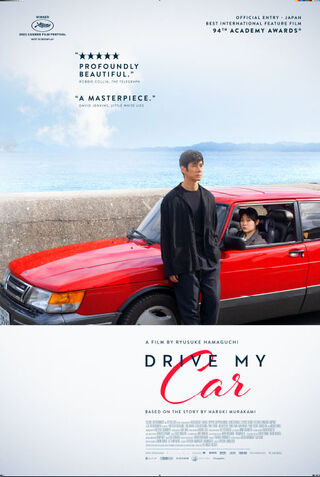Self-Control
Hamaguchi’s “Drive My Car” and the Myth of Self-Regulation
A film with deep lessons for life, psychology and relationship.
Posted February 7, 2022 Reviewed by Kaja Perina

Ryusuke Hamaguchi’s Drive My Car, based on a short story by Haruki Murakami, is an eloquent, subtle masterpiece, Japan’s well-deserving entry for this year’s Academy Award for Best International Feature. The 3-hour film is intensely personal, subtle, and observant of interiority, emotional restraint, and relationship, and is still with me days after I saw it, much like the 5 hour-long Happy Hour, Hamaguchi’s earlier film. Just as during Happy Hour, I didn’t look at my watch once or take a break. Compare that to my viewing of Marvel’s Eternals (which I only saw because of director Chloé Zhao) – I had to leave the theater about 15 minutes in, so aghast was I at the absurdity of the film, plot and characters. In contrast, Drive My Car was a perfect (late?) pandemic movie, cocooning me in the womb of a dark, near empty theater, shoulder-to-shoulder and heart-to-heart with characters I liked and whose lives resonated in the deepest chambers of my heart, sometimes moving me to tears in resonance of loss, grief, and longing. (Minor spoilers ahead!)
There are some five or six losses depicted or mentioned in the film, and the timeline itself edges into our pandemic world, bringing us right into our own losses. I was reminded that beneath the impassive or otherwise occupied faces we see all around us day-to-day are hidden losses that shape each of our lives. Perhaps our suffering is proportional to the depth that we realize this reality and do our best to fill the gaps for each other. Drive My Car is in part a dialogue between bystandership and companionship, passivity in the face of difficulty vs. showing affect, showing that the other person affects us profoundly. Don’t we all need to hear these words from our closest relationships: “I love you;” “I see you;” “I miss you;” “I need you”? And if these are true, is it not true we can be or are hurt by our loved ones? How do we deal with that? Must we deal with our hurt alone? Will the revelation of our hurt bring us closer or drive us apart? What does it mean to turn over at least part of our emotional lives to another person, to ask them to “drive my car”?
This brings up the question of ‘emotional self-regulation,’ with which I have always had trouble. On the one hand, sure, it’s theoretically great to take care of one’s own difficult emotions when they arise. On the other hand, we are inescapably bound to each other. We have open limbic loops and we are exquisitely sensitive to one another. We affect each other’s moods, heart rates and rhythms, hormone levels, and so forth. We pick up on vibes, and empathy and compassion makes us even more sensitive. In infancy and childhood, we are extremely and near totally dependent on relationship to regulate ourselves physically and emotionally. As attachment theorist John Bowlby wrote, “there is no such thing as a baby. There is a baby and someone.” This changes as we grow and mature, but I don’t think we are ever completely “independent,” though our individualistic culture tries to demand that we be entirely self-sufficient. We are always looking to each other, and sometimes trying to look into each other as well, to understand and be understood. Our sensitivity requires both self-regulation and interactivity, mirroring and self-awareness.
In the US, perhaps the extreme viewpoint is “I should be able to do whatever I want without being concerned about my effects on others.” In Japan, a more interdependent society, the opposite is often true, perhaps with overconcern about what others think. This raises the question in the film of how one deals with others’ effects on us. On the one hand, the film gives examples of the great latitude individuals can be afforded in a dependent, perhaps co-dependent, relationship, and also the lasting long-tailed damage, loss and reverberations that these individuals can leave. What are individual journeys about? Is it power? Satisfaction of desire? Some mysterious, haunting, and sometimes misshapen quest for presence, validation and relationship?
The film offers no easy answers, and there clearly is no black-and-white solution. What is clear, though, is that the characters need each other, and the revelation of their losses and needs does in fact bring them closer together, and perhaps spins them a little closer toward wholeness.
What happens when we are fully here for each other, in all vulnerability and need, admitting that we do in fact need each other? Hamaguchi’s film brings us to a greater depth of being, inextricably interwoven with being with – ourselves and others.
Life can do that too, if we let it.
(c) 2022 Ravi Chandra, M.D., D.F.A.P.A.


